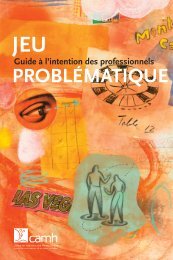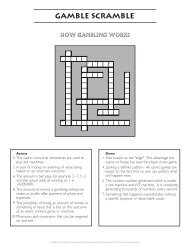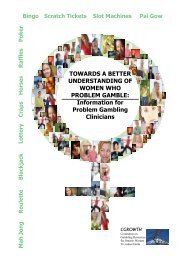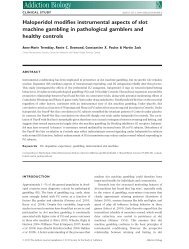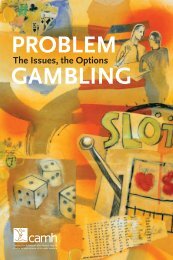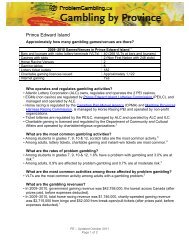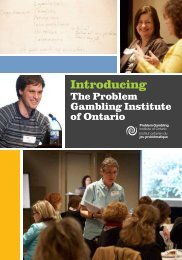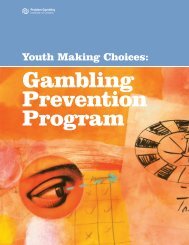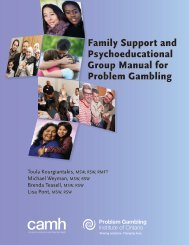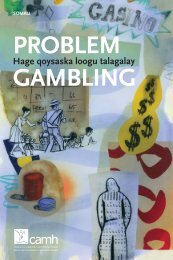Problem Gambling - A Guide for Families (PDF) - ProblemGambling.ca
Problem Gambling - A Guide for Families (PDF) - ProblemGambling.ca
Problem Gambling - A Guide for Families (PDF) - ProblemGambling.ca
Create successful ePaper yourself
Turn your PDF publications into a flip-book with our unique Google optimized e-Paper software.
<strong>Problem</strong> <strong>Gambling</strong>: A <strong>Guide</strong> <strong>for</strong> <strong>Families</strong><br />
Even if the person who gambles will not co-operate, you still<br />
have the right to protect your family’s money.<br />
Returning to<br />
normal family<br />
routines is an<br />
important part<br />
of healing.<br />
tips <strong>for</strong> protecting your money<br />
Here are some ways to protect the family’s money from out-ofcontrol<br />
gambling:<br />
• Throw away appli<strong>ca</strong>tions <strong>for</strong> credit <strong>ca</strong>rds or loans that come in<br />
the mail.<br />
• Pay all bills yourself.<br />
• Cancel any overdrafts on bank accounts.<br />
• Set up a separate bank account.<br />
• Remove your name from shared credit <strong>ca</strong>rds and bank accounts.<br />
• Do not share your PINs, or leave credit <strong>ca</strong>rds or money around.<br />
• Put valuable items in a safety deposit.<br />
• Put savings in bonds that you <strong>ca</strong>n’t access.<br />
• Ask the bank to cut off credit, and not to allow your home to be<br />
remortgaged.<br />
• If your family member is willing, get a power of attorney that<br />
puts you in charge of all property decisions.<br />
• Arrange <strong>for</strong> your wages or salary to be paid directly into your<br />
bank account.<br />
• Warn family, friends and co-workers not to lend the person money.<br />
• Give the person an agreed-upon weekly allowance.<br />
• Get legal advice so you know your rights and know what legal<br />
steps to take.<br />
.<br />
The first step is to assess your financial situation. How much<br />
money has been lost Which debts are shared and which belong<br />
only to the person who gambles This step <strong>ca</strong>n be emotionally<br />
difficult. It is common <strong>for</strong> those with gambling problems to<br />
have difficulty being open about their debts. It may take time<br />
<strong>for</strong> them to “come clean,” particularly if they will have to admit<br />
to past lies. Since trust has become such a serious issue<br />
between you, they may fear that you will reject them entirely if<br />
you learn the truth. And they may be hanging on to some areas<br />
of secrecy as a route to return to gambling. These feelings and<br />
32



